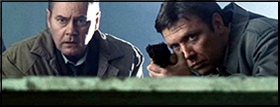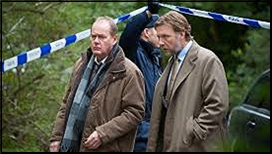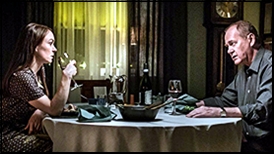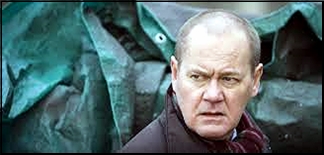Wed 23 Oct 2019
A TV Series Review by David Vineyard: BECK (Sweden, 1997- ).
Posted by Steve under Reviews , TV mysteries[8] Comments
BECK. Sweden, beginning 1997. 10 seasons to date (not consecutive). Peter Haber, Mikael Persbrandt. Based on the characters created by Maj Sjowall and Per Wahloo.

A few notes before going on with the review, the first being that much of the information on this series at IMDb is wrong. The series ran ten seasons (all available on Hulu), not six. (*) The 1997 series does not have the same cast as the one produced in 1993, and most of the episode descriptions are wildly wrong. It is not a series about “Martin Beck and his eccentric partner,†as IMDb suggests, and the story lines read as though they were written by someone with limited understanding of Swedish who didn’t have English subtitles. They sound like bad guessing based on badly translated TV Guide summaries.
Based on the series of books by the husband and wife writing team of Maj Sjowall and Per Wahloo, Beck follows a Stockholm based homicide squad in Sweden lead by Martin Beck (Peter Haber), a weary stodgy but gifted policeman with troubles at home, hypochondria, and resentment of the difficulty created by politics interfering with his investigations. Typically one of his detectives Lena Klingstrom (Stina Rautlein) formerly had an affair with and lived with Beck, but is now back on his team.

His top investigator Gunvald Larsson is given to overuse of violence and questionable tactics, and something of an attractive oaf in the books, here played by Mikael Persbrandt (Swedish televisions spy series Hamilton) as the most attractive character in the series, whose brutal tactics usually work though he runs afoul of Internal Affairs fairly often. Gunvald is jealous of his position on the team, often rude, sexist, and would be a total ass if Persbrandt wasn’t such a good actor and the writers obviously enthralled by actor and character. As is, he brings much needed charisma to the series and an antidote to Haber’s Beck’s pained expressions and sad sack existence.
As in the books the series is a police procedural, but beyond the name of the two main characters, once the second season passed, the episodes have little to do with Sjowall and Wahloo’s rather dark view of Sweden. (Wahloo was a Marxist -leaning journalist who weighs the books down a bit with his bleak view of his country and anything vaguely resembling Democracy.) A few episodes in the first two seasons reflect this, and Beck’s hypochondria emerges off and on over the course of the series, but the series presents a brightly lit colorful view of Sweden even when tackling serious issues (which it does well and regularly) like drugs, child abuse, government abuses, corporate crime, and the like.

The wealthy and powerful don’t fare all that well, so some of Wahloo’s Marxist philosophy still slips through. By the by, I’m not being political, Wahloo was a well,known actual Marxist,leaning journalist highly critical of his homeland and the West. It’s how he was known before he began writing mystery novels. It’s not my opinion, it’s his own description of himself.
And while true to the books, the series spends far too much time on Beck’s tiresomely painful private life. Rebecka Hemse has a recurring role as his combative single-mother daughter Inger who in the most recent season is secretly seeing Larsson, who is twelve years older than her. Beck is not happy when he finds out.
Also filling out far too much of the time of the average 1 hour and 25 minute episode (many episodes were released as movies) is Beck’s annoying neighbor, or “Grannen” (Ingvar Hirdwall), who is not only eccentric, but insulting, casually racist, and boring as hell. Maybe I just don’t understand the Swedish sense of humor, but I clearly don’t get this guy who seems to have wandered in from a bad episode of Seinfeld.
But aside from that character, the actors are good with Haber (not my idea of Beck at all) quite good, and Persbrandt far more charismatic than the books ever imagined Gunvald.
Episodes are good, they just aren’t Martin Beck, at least not Sjowall and Wahloo’s Martin Beck. Some of them are very good though.
“The Japanese Print†from the most recent season is a good example. Hans Sperbling is a grossly obese German policeman who has assisted Beck in Germany in the past; he’s pretty much Germany’s Beck. He has come to Stockholm quietly to bid at an art auction on a rare signed Shunga period erotic print, which he loses out to an attractive woman who identifies herself as an art agent and offers him first look at some Shunga prints and Marc Chagall prints she has in her room later that evening.

When she doesn’t show up he goes upstairs at the hotel and finds her room open. He calls his friend Martin Beck and together they find her murdered, posed like a well known Chagall print “Woman on Bed of Rosesâ€, and the prints gone.
Gunvald doesn’t much trust his boss’s German friend, who despite Beck’s protests has to stay during the investigation. There are two more murders each a tableau mordant copying works of art.
Meanwhile Beck’s grandson drops the bomb that Gunvald is dating Inger.
The investigation leads to dealers who fix low prices at auctions illegally as well as a series of fake Chagall prints made from the original color lithographic stones that were supposed to have been destroyed. It turns out to be a multi million dollar scam and ends with Sperbling and Gunvald teamed in what works out to be a pretty good Nero Wolfe/Archie Goodwin vibe before going a bit melodramatic at the end with a wealthy mad collector and his armed henchmen.

To be honest, the fat German and Gunvald are a more interesting team than Beck and Gunvald.
The series shown on Hulu is subtitled, but this particular episode includes long sequences in English, and most episodes have some English language dialogue.
Other than Beck’s neighbor and private life, the usual problems with series television apply. Far too many episodes end in gunfire, far too often the criminal is brought in out of thin air, and more often than is good for the series, the protagonists somehow manage to get “revenge†on the bad guy. Almost none of those problems were true to the books, which were often clever, and I suspect not to the 1993 episodes often based on the novels.

Other than the climate, there is nothing very Swedish about the series. The plots are mostly clever and well done, acting good, and writing above average, but they could be set in any large Western capital in any country and any language, and you wouldn’t notice much of a change, a reminder that Walter Matthau and Bruce Dern played Beck and Gunvald in the Americanized film of The Laughing Policeman.
—
(*) IMDB says six seasons, but lists episodes since 1997 with breaks of several years between episodes over the years, the last in 2018. Wikipedia has seven seasons, but Hulu lists the series as ten seasons as did MHv where the series was also shown. I would tend to suspect both IMDb and Wikipedia haven’t been updated since they were written.

October 23rd, 2019 at 9:25 am
Re IMDB. useful, but untrustworthy as a definitive source. For example, The Christmas Kid, a film project shot in Almeria in 1965 with my involvement has something, of no consequence regarding Tab and Jeff Hunter. Impossible to correct. Going back to the Louis Hayward entry, it had in the section on biography, him playing twins in multiple films, which is untrue. I believe that has been corrected after half dozen or so notes, but frankly cannot bear the site. IMDB pro is much better. Less bull shit, but not perfect.
October 23rd, 2019 at 10:10 am
Walter Matthau played Beck in THE LAUGHING POLICEMAN with the name changed to Jake Martin from Martin Beck.
October 23rd, 2019 at 10:54 am
And Walter Matthau is a long time favorite of mine. I don’t know why I’ve never seen him in it.
I’ve also never watched any of the Beck series made for Swedish TV. Another huge gap in my viewing career!
October 23rd, 2019 at 10:51 am
Just a quick comment from a Swede: the name of Ingvar Hirdwall’s character isn’t actually “Grannen”, that’s just a description of him.
Granne = neighbour. 🙂
(Also, it’s Persbrandt, not Perbrandt.)
October 23rd, 2019 at 7:52 pm
Thanks, Christian. Sorry for the delay in replying. I had some brief computer problems, but I’m back online and I’ve made the corrections. Glad you spotted both errors!
October 23rd, 2019 at 3:35 pm
Bruce Dern basically played a character based on Gunvald Larsson in POLICEMAN’
October 23rd, 2019 at 4:09 pm
Just for completists, I recommend finding the two mystery novels written by Wahloo alone about Inspector Jensen, set in a bleak totalitarian near future Sweden. I like the Beck books, but really enjoyed the darker Jensen books where the bureaucratic interference and danger of upsetting the authorities make it even harder for Jensen to solve the case, the first of the two probably Wahloo’s best book (I’m not sure how much Sjowall contributed to the writing, but the series stopped when Wahloo died).
Sjowall and Wahloo and probably Jan Wilhelm de Wettering are most responsible for opening the American market to something more than Simenon and Maigret (there had been fitful attempts at pushing more European writers here). Hanning Mankell and Wallander may be best known of their followers, but the greater variety of material available to American readers is largely due to the success of Sjowall and Wahloo and de Wettering, though I would also give a bit of credit to Brit Nicholas Freeling and the success of Van der Valk and Castang.
In the first season Beck was much closer to Wahloo, even doing an episode where two Swedish intelligence agents try to frame a Russian diplomat having an affair with a Swedish government minister for murder so they can have him expelled. By later seasons Beck is openly cooperating with Swedish intelligence and ironically Persbrandt starred in the television version of Commander Hamilton (Peter Stormare in films) a Swedish operative assigned to NATO (the closest thing you may ever see to Matt Helm done right on screen).
Incidentally, detective lovers, if you are looking for a good place to invest your streaming dollars MHz has numerous European detective series not easy to find here including the fine Bruno Cremar Maigret series. If you don’t mind subtitles it’s a great source for some of Europe’s best detective fiction.
November 11th, 2019 at 9:05 am
I really, really like that team-up of Walter Matthau and Bruce Dern. Louis Gossett Jr., co-starred as well. Strange flick; I admit it was not entirely effective in all its aims.
But to this day I *never* sit in a train or bus unless my back is against the rear wall of the last car.
Classic lines of dialogue: “that better be a sandwich you’re reaching for, ’cause you’re gonna have to eat it” (Gossett Jr to a pimp he has just shoved to the sidewalk).
And Matthau: indignant that the urban guerrillas he is riding with, are okay driving fast through town with C-4 in the trunk. “What’s-a matter with you guys? This is a residential neighborhood…”